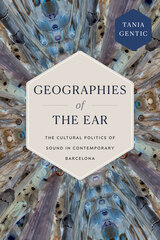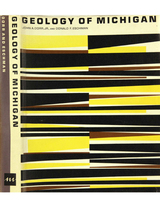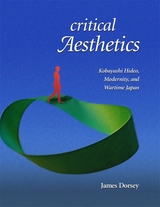
This study revolves around the career of Kobayashi Hideo (1902–1983), one of the seminal figures in the history of modern Japanese literary criticism, whose interpretive vision was forged amidst the cultural and ideological crises that dominated intellectual discourse between the 1920s and the 1940s.
Kobayashi sought in criticism a vehicle through which to rhetorically restore to the artistic work an aura of concreteness that precluded interpretation and instead inspired awe, to somehow recover a literary experience unmediated by intellectual machinations. In adhering firmly to this worldview for the duration of World War II, Kobayashi came to assume a complex stance toward the wartime regime. Although his interweaving of aesthetics and ideology exhibited elements of both resistance and complicity, his critical ethos served ultimately to undergird his wartime fascist stance by encouraging acquiescence to authority, championing patriotism, and calling for more vigorous thought control.
Treating Kobayashi’s influential works and the historical context in which they are rooted, James Dorsey traces the emergence of a modern critical consciousness in conversation with such concerns as the nature of materiality in capitalist culture, the relationship of narrative to subjectivity, and the nostalgia for beauty in a time of war.
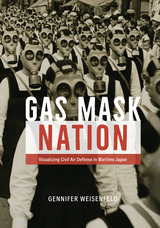
Airplanes, gas masks, and bombs were common images in wartime Japan. Yet amid these emblems of anxiety, tasty caramels were offered to children with paper gas masks as promotional giveaways, and magazines featured everything from attractive models in the latest civil defense fashion to futuristic weapons.
Gas Mask Nation explores the multilayered construction of an anxious yet perversely pleasurable visual culture of Japanese civil air defense—or bōkū—through a diverse range of artworks, photographs, films and newsreels, magazine illustrations, postcards, cartoons, advertising, fashion, everyday goods, government posters, and state propaganda. Gennifer Weisenfeld reveals the immersive aspects of this culture, in which Japan’s imperial subjects were mobilized to regularly perform highly orchestrated civil air defense drills throughout the country.
The war years in Japan are often portrayed as a landscape of privation and suppression under the censorship of the war machine. But alongside the horrors, pleasure, desire, wonder, creativity, and humor were all still abundantly present in a period before air raids went from being a fearful specter to a deadly reality.
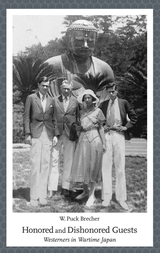
The brutality and racial hatred exhibited by Japan’s military during the Pacific War piqued outrage in the West and fanned resentments throughout Asia. Public understanding of Japan’s wartime atrocities, however, often fails to differentiate the racial agendas of its military and government elites from the racial values held by the Japanese people. While not denying brutalities committed by the Japanese military, Honored and Dishonored Guests overturns these standard narratives and demonstrates rather that Japan’s racial attitudes during wartime are more accurately discerned in the treatment of Western civilians living in Japan than the experiences of enemy POWs.
The book chronicles Western communities in wartime Japan, using this body of experiences to reconsider allegations of Japanese racism and racial hatred. Its bold thesis is borne out by a broad mosaic of stories from dozens of foreign families and individuals who variously endured police harassment, suspicion, relocation, starvation, denaturalization, internment, and torture, as well as extraordinary acts of charity. The book’s account of stranded Westerners—from Tokyo, Yokohama, and Kobe to the mountain resorts of Karuizawa and Hakone—yields a unique interpretation of race relations and wartime life in Japan.
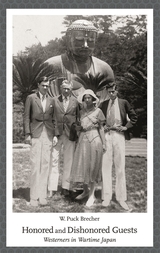
The brutality and racial hatred exhibited by Japan’s military during the Pacific War piqued outrage in the West and fanned resentments throughout Asia. Public understanding of Japan’s wartime atrocities, however, often fails to differentiate the racial agendas of its military and government elites from the racial values held by the Japanese people. While not denying brutalities committed by the Japanese military, Honored and Dishonored Guests overturns these standard narratives and demonstrates rather that Japan’s racial attitudes during wartime are more accurately discerned in the treatment of Western civilians living in Japan than the experiences of enemy POWs.
The book chronicles Western communities in wartime Japan, using this body of experiences to reconsider allegations of Japanese racism and racial hatred. Its bold thesis is borne out by a broad mosaic of stories from dozens of foreign families and individuals who variously endured police harassment, suspicion, relocation, starvation, denaturalization, internment, and torture, as well as extraordinary acts of charity. The book’s account of stranded Westerners—from Tokyo, Yokohama, and Kobe to the mountain resorts of Karuizawa and Hakone—yields a unique interpretation of race relations and wartime life in Japan.
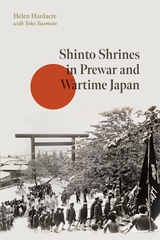
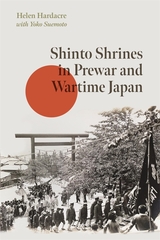
READERS
Browse our collection.
PUBLISHERS
See BiblioVault's publisher services.
STUDENT SERVICES
Files for college accessibility offices.
UChicago Accessibility Resources
home | accessibility | search | about | contact us
BiblioVault ® 2001 - 2025
The University of Chicago Press


